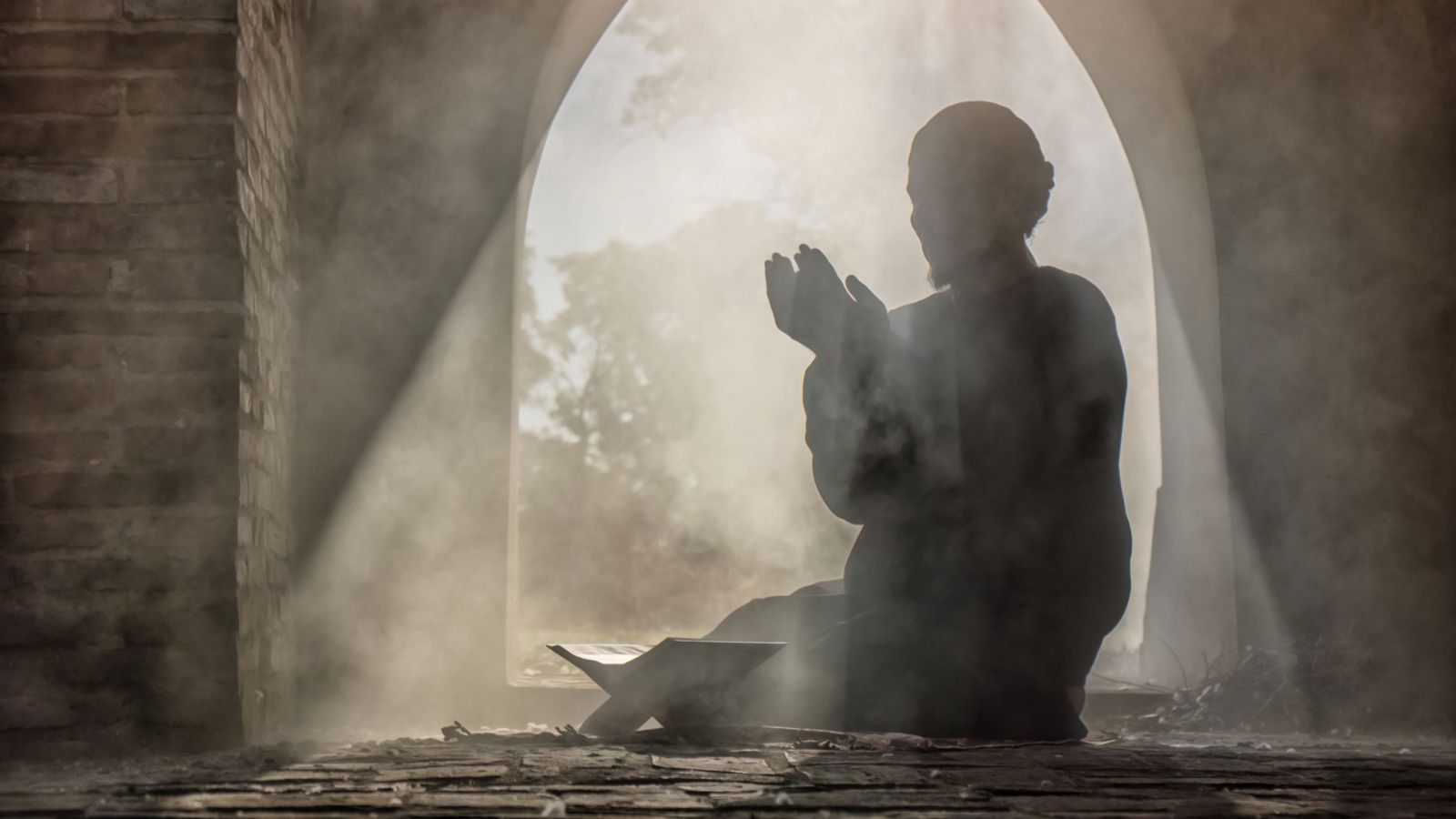Contemplation in Prayer
Imām Muḥammad ibn Ṣāliḥ al-ʿUthaymīn


Standing and prostrating have been (specifically) mentioned because standing in prayer is better than prostration with respect to the remembrance of Allāh, and prostration is better with respect to its appearance and condition.
Chapter: Contemplation [Murāqaba]
Allāh says,
“Who sees you when you stand up [for prayer], and your movements along with those who fall prostrate”
[26:218-219]
And also,
“He is with you wheresoever you may be”
[57:4]
He, The Most High, also says,
“Truly nothing is hidden from Allāh, in the earth or in the heavens”
[3:5]
And in another place, He mentions,
“Indeed, your Lord is Ever-Watchful (over them)”
[89:14]
And also,
“Allāh knows the fraud of the eyes and all that the breasts conceal”
[40:19]
The verses concerning this are many and well known.
After mentioning the chapter concerning Truthfulness and the verses and aḥādīth pertaining to it, the author follows this up with the chapter concerning Contemplation. There are two aspects to contemplation:
That you contemplate Allāh, Azza wa Jall
That you know that Allāh is watching you as He says, “and Allāh is Ever a Watcher (Raqībā) over all things.”
As for your contemplating Allāh, then this is that you know that Allāh, the Exalted, Knows your every saying, action, or belief, as He said,
“And put your trust in the All-Mighty, the Most Merciful – Who sees you when you stand up [for prayer] and your movements along with those who fall prostrate”
[26:216-218]
“Who sees you as you stand” meaning at night, when the person stands in a place in seclusion from others such that no one would see him, but Allāh, Subḥānahu wa Taʿālá, sees Him even if he is in the darkest and most intense of darkness.
Means at night, when the person stands in a place in seclusion from others such that no one would see him, but Allāh, Subḥānahu wa Taʿālá, sees Him even if he is in the darkest and most intense of darkness.
“And your movements along with those who prostrate” meaning: and you move along with all those who prostrate to Allāh in this hour, for indeed Allāh sees a person when he stands and prostrates. Standing and prostrating have been (specifically) mentioned because standing in prayer is better than prostration with respect to the remembrance of Allāh, and prostration is better with respect to its appearance and condition. As for the standing being better than the prostration with respect to remembrance then this is because the legislated remembrance in the state of standing is the recitation of the Qurʾān and the Qurʾān is the noblest of speech. As for the prostration being better than the standing with respect to its appearance and condition, then this is because the person in the state of prostration is closest to His Lord, Azza wa Jall, as is established from the Prophet (ṣallallāhu ʿalayhi wa-sallam) when he said, meaning: “And you move along with all those who prostrate to Allāh in this hour, for indeed Allāh sees a person when he stands and prostrates. Standing and prostrating have been (specifically) mentioned because standing in prayer is better than prostration with respect to the remembrance of Allāh, and prostration is better with respect to its appearance and condition. As for the standing being better than the prostration with respect to remembrance, then this is because the legislated remembrance in the state of standing is the recitation of the Qurʾān and the Qurʾān is the noblest of speech. As for the prostration being better than the standing with respect to its appearance and condition, then this is because the person in the state of prostration is closest to His Lord, Azza wa Jall, as is established from the Prophet (ṣallallāhu ʿalayhi wa-sallam) when he said:
“The closest a person is to His Lord is when he is in prostration” [Muslim]. This is why we have been commanded to increase our supplications while in prostration.
Also, from your contemplating Allāh is that you know that Allāh hears every single thing that you say as He said,
“or do they think that We Hear not their secrets and private discourse? [Indeed, We do] and Our Messengers are by them, to record”
[43:80]
And along with this, that you know that every good or evil thing that you say, be it openly or secretly then it is written – for or against you. Allāh, The Blessed and Exalted says,
“not a word does he utter, but there is a watcher by him ready (to record it)”
[50:18]
Know this, and beware! Beware that there emits from your tongue a saying which will count against you on the Day of Judgement. Make sure that your tongue is continuously articulating the truth or that it remains silent as the Messenger of Allāh (ṣallallāhu ʿalayhi wa-sallam) said, “whosoever believes in Allāh and the Last Day then let him speak only good or remain silent” [Bukhārī].
(Also from your contemplating Allāh) is that you do so with regards to your secrets and what is in your heart. Look to what is in your heart! Associating partners with Allāh, showing off, deviations, jealousy, hatred and dislike displayed towards the Muslims, love of the disbelievers and other such things that Allāh is not Pleased with. Supervise and be attentive to your heart for Allāh has said,
“Indeed We created man, and We know what his own self whispers to him”
[50:16]
So contemplate Allāh in these three places, in your actions, your saying and your heart so that your contemplation may be complete. This is why, when the Prophet ﷺ was asked about Iḥsān, he replied, “that you worship Allāh as if you see Him, and if you do not see Him, then indeed He sees you.”
Worship Allāh as if you see Him and witness Him with the eye, and if you do not see Him then go to the next station below this: then indeed He sees you.
So the first station is to worship Him out of hope and desire. The next is to worship Him out of fear and awe this is why he said, “and if you do not see Him, then indeed He sees you.”
So it is necessary for the person to contemplate His Lord and that he knows that Allāh is Watching over you. Anything that you say or do or secret that you keep, Allāh, Exalted is He, Knows it. The author has mentioned a number of verses that prove this and began with the verse that we have already mentioned,
“And put your trust in the All-Mighty, the Most Merciful – Who sees you when you stand up [for prayer] and your movements along with those who fall prostrate”
[26:216-218]
Allāh says,
“Who sees you when you stand up [for prayer], and your movements along with those who fall prostrate”
[26:218-219]
And also,
“He is with you wheresoever you may be”
[57:4]
He, The Most High, also says,
“Truly nothing is hidden from Allāh, in the earth or in the heavens”
[3:5]
And in another place, He mentions,
“Indeed, your Lord is Ever-Watchful (over them)”
[89:14]
And also,
“Allāh knows the fraud of the eyes and all that the breasts conceal”
[40:19]
The verses concerning this are many and well known.
After mentioning the chapter concerning Truthfulness and the verses and aḥādīth pertaining to it, the author follows this up with the chapter concerning Contemplation. There are two aspects to contemplation:
That you contemplate Allāh, Azza wa Jall
That you know that Allāh is watching you as He says, “and Allāh is Ever a Watcher (Raqībā) over all things.”
As for your contemplating Allāh, then this is that you know that Allāh, the Exalted, Knows your every saying, action
or belief, as He said,
“And put your trust in the All-Mighty, the Most Merciful – Who sees you when you stand up [for prayer] and your movements along with those who fall prostrate”
[26:216-218]
“Who sees you as you stand” meaning at night, when the person stands in a place in seclusion from others such that no one would see him, but Allāh, Subḥānahu wa Taʿālá, sees Him even if he is in the darkest and most intense of darkness.
Meaning at night, when the person stands in a place in seclusion from others such that no one would see him, but Allāh, Subḥānahu wa Taʿālá, sees Him even if he is in the darkest and most intense of darkness.
“And your movements along with those who prostrate” meaning: and you move along with all those who prostrate to Allāh in this hour, for indeed Allāh sees a person when he stands and prostrates. Standing and prostrating have been (specifically) mentioned because standing in prayer is better than prostration with respect to the remembrance of Allāh, and prostration is better with respect to its appearance and condition. As for the standing being better than the prostration with respect to remembrance then this is because the legislated remembrance in the state of standing is the recitation of the Qurʾān and the Qurʾān is the noblest of speech. As for the prostration being better than the standing with respect to its appearance and condition, then this is because the person in the state of prostration is closest to His Lord, Azza wa Jall, as is established from the Prophet (ṣallallāhu ʿalayhi wa-sallam) when he said, meaning: “And you move along with all those who prostrate to Allāh in this hour, for indeed Allāh sees a person when he stands and prostrates. Standing and prostrating have been (specifically) mentioned because standing in prayer is better than prostration with respect to the remembrance of Allāh, and prostration is better with respect to its appearance and condition. As for the standing being better than the prostration with respect to remembrance, then this is because the legislated remembrance in the state of standing is the recitation of the Qurʾān and the Qurʾān is the noblest of speech. As for the prostration being better than the standing with respect to its appearance and condition, then this is because the person in the state of prostration is closest to His Lord, Azza wa Jall, as is established from the Prophet (ṣallallāhu ʿalayhi wa-sallam) when he said:
“The closest a person is to His Lord is when he is in prostration” [Muslim]. This is why we have been commanded to increase our supplications while in prostration.
Also, from your contemplating Allāh is that you know that Allāh hears every single thing that you say as He said,
“or do they think that We Hear not their secrets and private discourse? [Indeed, We do] and Our Messengers are by them, to record”
[43:80]
And along with this, that you know that every good or evil thing that you say, be it openly or secretly then it is written – for or against you. Allāh, The Blessed and Exalted says,
“not a word does he utter, but there is a watcher by him ready (to record it)”
[50:18]
Know this, and beware! Beware that there emits from your tongue a saying which will count against you on the Day of Judgement. Make sure that your tongue is continuously articulating the truth or that it remains silent as the Messenger of Allāh ﷺ said, “whosoever believes in Allāh and the Last Day then let him speak only good or remain silent” [Bukhārī].
(Also from your contemplating Allāh) is that you do so with regards to your secrets and what is in your heart. Look to what is in your heart! Associating partners with Allāh, showing off, deviations, jealousy, hatred and dislike displayed towards the Muslims, love of the disbelievers and other such things that Allāh is not Pleased with. Supervise and be attentive to your heart for Allāh has said,
“Indeed We created man, and We know what his own self whispers to him”
[50:16]
So contemplate Allāh in these three places, in your actions, your saying and your heart so that your contemplation may be complete. This is why, when the Prophet ﷺ was asked about Iḥsān, he replied, “that you worship Allāh as if you see Him, and if you do not see Him, then indeed He sees you.”
Worship Allāh as if you see Him and witness Him with the eye, and if you do not see Him then go to the next station below this: then indeed He sees you.
So the first station is to worship Him out of hope and desire. The next is to worship Him out of fear and awe this is why he said, “and if you do not see Him, then indeed He sees you.”
So it is necessary for the person to contemplate His Lord and that he knows that Allāh is Watching over you. Anything that you say or do or secret that you keep, Allāh, Exalted is He, Knows it. The author has mentioned a number of verses that prove this and began with the verse that we have already mentioned,
“And put your trust in the All-Mighty, the Most Merciful – Who sees you when you stand up [for prayer] and your movements along with those who fall prostrate”
[26:216-218]

















